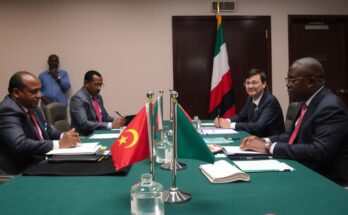Argentina, under President Javier Milei, surprised the world by voting ‘no’ on a U.N. resolution aimed at combating gender violence, becoming an international outlier among progressive nations. The vote has generated considerable criticism from various political factions in Argentina, highlighting a significant shift in the country’s foreign policy and social agenda. Milei’s administration mirrors right-wing populist trends, raising concerns about potential isolation and the rollback of social gains.
In a shocking departure from its traditionally progressive stance, Argentina, under President Javier Milei, recently became the sole nation to vote against a United Nations resolution denouncing violence against women and girls. This vote has stirred widespread backlash both from within Argentina and globally, highlighting a significant shift in the country’s foreign policy. Traditionally known for its progressive initiatives, such a vote marks Argentina’s alignment with more isolationist and conservative ideologies. Milei’s administration has been characterized by a series of abrupt policy changes and confrontational stances reminiscent of former U.S. President Donald Trump. Just days before the U.N. vote, he recalled Argentina’s negotiators from the U.N. climate summit, which raises concerns over a potential withdrawal from global agreements like the Paris accord. Milei’s foreign policy reflects a strategic pivot towards the United States and Israel, diverging from Argentina’s historical role as a leader in the Global South. The backlash against Milei’s vote has united political adversaries in Argentina, with criticism spanning from former aides of past administrations to centrist lawmakers condemning the move as emblematic of a broader cultural war. This disapproval highlights fears of international isolation resulting from the government’s decision to prioritize less conventional alliances and fringe positions on critical global issues. Furthermore, Milei’s government has undertaken a drastic overhaul of domestic policies, eliminating key ministries and programs aimed at promoting social equality, particularly regarding women’s rights and environmental protections. The decision has generated alarm about the preservation of Argentina’s progressive achievements, such as the legalization of abortion and initiatives aimed at combating climate change. In summary, Milei’s administration continues to redefine Argentina’s position on the global stage amidst a cultural climate marked by right-wing populism. This approach raises critical questions regarding the future of social policies within the nation and suggests a potential drift towards political isolation as the government aligns itself with global conservative agendas.
The article discusses Argentina’s recent decision to vote ‘no’ on a critical United Nations resolution aimed at ending gender violence, marking its isolation among traditionally supportive nations. The context is set against President Javier Milei’s broader strategy, which seeks substantial shifts in the country’s political landscape and foreign policy, reflecting a trend towards alignment with conservative ideologies reminiscent of the Trump administration. This decision has sparked considerable internal and external criticism, raising concerns over social policy regressions and international isolation.
In conclusion, Argentina’s recent U.N. vote against ending gender violence signals a notable departure from its historically progressive stance on social issues. Under President Javier Milei’s administration, the country is realigning its foreign policy towards fringe, conservative positions, raising alarms about potential social and diplomatic isolation. The backlash from various sectors within Argentina underscores the divided national sentiment regarding Milei’s controversial policies and ideological shifts.
Original Source: apnews.com




